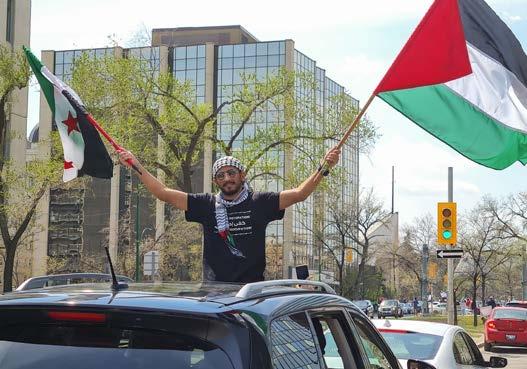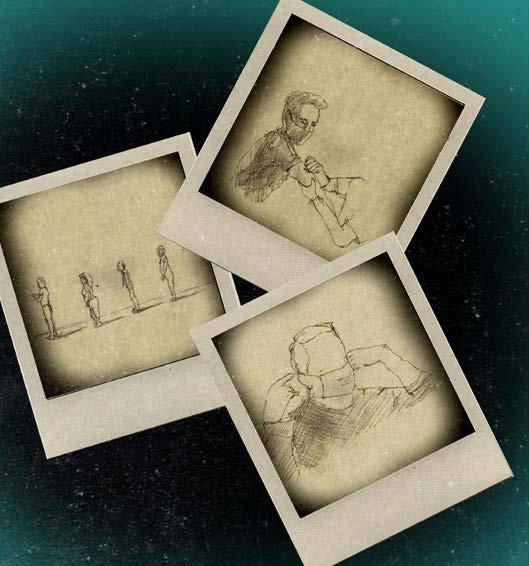
9 minute read
News pages 3 to
Solidarity with Palestinians on UMSU agenda
Informal group hopes to raise awareness, advocate for students impacted by conflict
NEWS
Cam Cannon, staff An informal coalition of forty students at the University of Manitoba has managed to bring forward two motions to the UMSU board of directors regarding the state of Israel’s illegal occupation of Palestinian territories and protections for students impacted by the Palestinian struggle.
/ staff Basel Abdelaziz photo /
The two motions were moved by Tabitha Clavecillas and seconded by the Arts Student Body Council (ASBC) at the board of directors meeting July 22. They were then recommended to the executive committee and will be brought back for a final vote.
The coalition formed in early May during a period of heightened of violence during which Israeli bombardments killed 200 Palestinians, including 59 children, within a week.
Iqra Tariq, a science student in her final year and former president of the Muslim Students’ Association (MSA) explained in an interview that the goals of the group are to pass these motions, release a statement to raise awareness and form a Students for Justice in Palestine group on campus.
The group also plans to pursue a human rights complaint against the Asper School of Business.
Amid a tense media climate and a period of intensified discourse over human rights abuses in Israel/ Palestine among faculty and students in May, the Asper school of business sent an email to students which members of the group said was threatening.
In the email, which had the subject line “Offensive social media posts by Asper students,” it is mentioned that the school is aware of students posting “inflammatory messages” regarding conflict in the Middle East and warned that “anything you post […] can come back to haunt you later in life.”
“It was a direct threat to [the lives of international students] and their futures and their careers,” said Tariq.
“That was something that made me believe that there was a lot of work to be done at the University of Manitoba when it comes to the Palestinian cause.”
Campus culture shuts out Palestinians
Zahra Rizvi, a member of the group and third-year computer science major, said that UMSU has historically failed when it comes to supporting Palestinian students. come with a disclaimer on campus and honestly Palestinian students are just very sick of it,” she said.
“We want to be able to talk about these issues without having to […] whitewash what we mean and what we want to say.”
In 2018, UMSU voted against the Canadian Federation of Students condemning the illegal occupation of Palestine by Israel and supporting the boycott, divestment and sanctions (BDS) movement. Then-UMSU president Jakob Sanderson claimed the motions were “divisive and ill-considered.”Years before that, in 2013, UMSU revoked the student group status of Students Against Israeli Apartheid, a student group that held annual Israeli Apartheid Weeks to raise awareness of ongoing human rights abuses in the occupied Palestinian territories.
Earlier this year, UMSU also adopted the controversial IHRA definition of antisemitism which has been criticized for its potential to be used in silencing pro-Palestinian speech.
Following the introduction of the motions in July, the group had a two-hour meeting with the UMSU executive in which they shared testimonials and discussed their needs.
Tariq described their reception by the executive as “accommodating.”
“UMSU does have a stance of being non-political and non-partisan,” said Tariq.
“As somebody who has a lot of experience in student leadership and student politics, I completely understand that student groups need to be inclusive of everybody, but in an effort of being inclusive we almost felt excluded.”
Tariq continued that this manifested in UMSU shying away from the use of words such as “crisis” and “Palestine” in talking about the issues being brought up by the group.
Huda Alfarekh, a third-year student in the faculty of science and member of the group, said that there also seems to be a double standard on campus.
Students Supporting Israel, a student group on campus co-founded by current UMSU vice president advocacy Emily Kalo, has operated on campus for years while pro-Palestinian groups have been removed from campus.
During the uptick in violence in May which saw riots against the eviction of Palestinians from their homes in Sheikh Jarrah followed by Israeli airstrikes in Gaza and Hamas firing rockets, the Students Supporting Israel group posted, “Now is the time to speak out for our people. We are not Jews with trembling knees. Speak out. Be Loud.”
Infographics accompanying the post call for supporters to “call out these blatant lies against Israel.”
Another post contains a video which claims that being anti-Zionist — a category that those who support the Palestinian right to self-determination often fall into — is inherently antisemitic.
“A lot of the time when Palestinian students come forward, they’re told immediately that this is a political issue, this is not our business, we don’t want to get involved,” said Alfarekh.
“My existence isn’t political. My culture isn’t political. This is something I’m affected with every day.”
Tariq said that getting other student groups to speak with theirs was difficult due to assumptions that they were attempting to force groups to take sides and exclude one viewpoint or group of people in favour of another.
“It took a while to get some student groups and student bodies willing to have a meeting with us because they felt like our work was not inclusive enough of both sides […] I think they didn’t realize that we weren’t asking them to choose a side.”
On September 1, a statement of in support of “the students who have been impacted by the apartheid, ethnic cleansing and violation of basic human rights in Palestine” was signed by the U of M Muslim, Pakistani, Bangladeshi and Arab students’ associations as well as the campus chapter of the Egyptian Student Association in North America.The statement also says the signatories “unconditionally support” the motions being brought forward by the informal group.
“What we want to come out of this is people who are willing to have conversations about what’s going on in Palestine,” said Tariq, “and students that are affected by the human rights crisis in Palestine and around the world.”
How we will remember the COVID-19 pandemic
Professor promotes historical perspectives on pandemic outbreaks online
RESEARCH & TECHNOLOGY
Michael Campbell, staff Esyllt Jones, a professor in the department of history, has launched Pandemic Histories, an online space dedicated to preserving and highlighting historical perspectives on epidemic and pandemic disease outbreaks. The website emphasizes the relationships between health, structural inequalities and lived experience.
Jones is also a professor in community health sciences, the dean of studies at St. John’s College, and the author of Influenza 1918: Disease, Death, and Struggle in Winnipeg.
“And for the next two years, I’m the faculty of arts humanities research professor,” Jones added.
“[The] faculty of arts began a new program last year, or earlier this year, that created two research professorships — one in the social sciences and one in the humanities. And it was an open application process, so I applied for a project that I call ‘Beyond the COVID-19 Pandemic.’”
The project has two components, the first being Pandemic Histories, and the second a history of community health. The second component examines the history of socialized medicine in Canada and the emergence of social movements such as feminism, Indigenous rights and community health models of care beginning in the late 1960s and ’70s. “The two projects are kind of linked together in my mind because, in the aftermath of the influenza pandemic at the end of the First World War, eventually there was a significant push for the creation of a more accessible health-care system,” Jones said.
Pandemic Histories aims to reach a non-specialist audience.
“It’s less meant as a showcase for academic research and more as a place where academic research and interested members of the public can engage with each other,” Jones explained.
The COVID-19 pandemic has highlighted and exacerbated inequalities around the world. In Winnipeg, the pandemic has caused a great deal of hardship for specific communities.
“I’m especially concerned about the experiences of non-elite members of society and the importance of preserving those groups that are frequently most impacted by pandemics,” Jones said.
“[Specifically] racialized groups, people of colour, Indigenous people, impoverished people living in inner cities, you know, poor rural families. I’d like to make sure that we don’t lose those stories.”
These stories are preserved and made accessible to researchers through archives. As a member of the Royal Society of Canada COVID-19 task force, Jones was involved with producing a policy paper urging supplemental support for archiving institutions in Canada.
Running counter to the memorialization mission of Pandemic Histories is the growing influx of misinformation. The COVID-19 pandemic has drawn out an incredible amount of misinformation regarding homeopathic medicines, vaccines and supposed miracle cures for the virus. While Pandemic Histories does not aim at tackling current misinformation about the ongoing pandemic, it does address the historical social context of facts and scientific discovery.
“It’s always important for us to understand that facts operate within a social context,” Jones said.
“And that’s something that historians of medicine and health and disease have a lot to say about, and something important to contribute on is the way we can understand the intersection between science and the societies in which it functions. So, I think it does help to understand, in a larger picture sort of way, where misinformation comes from and where it’s rooted.”
Jones highlighted the necessity of avoiding “the same phenomenon after COVID-19 that we had after the flu pandemic, which was this longterm historical forgetting, and really, an active forgetting.”
To forestall the cultural forgetting of COVID-19, Jones is inviting submissions to Pandemic Histories from a variety of communities, from a wide range of academics to members of the health-care community. Jones has offered her own reflection of her role as a pandemic historian in the time of a pandemic in her inaugural piece “On pandemic history and pandemic amnesia.”
The website also plays host to roundtables and webinars. Jones hopes to draw attention to the role of artists in major disease outbreaks and how artists have responded to and shaped our societal understanding of such outbreaks.
One such artistic reflection of the pandemic has been centred on the homepage of the site.
“If you go to the site right now, you have a wonderful screenshot from a project done by my friend Lilian Bonin, whose mother died of COVID-19 fairly early in the pandemic in Winnipeg,” Jones said.
During troubling times, people turn to art and spirituality to provide meaning to their experiences. One of Jones’s research interests is the emergence or popularization of spiritual practices in response to disease outbreaks. Jones said that despite the secular nature of modern North America, “there might very well be some spiritual sorts of movements that arise, [although] they might not look quite like spiritual wisdom” of past disease outbreaks.
“When […] there is a kind of mass death experience like this, there is the sense of, you know, having lost so many people, and this idea of these lost souls being in very close proximity with survivors. And that’s an important part of that early-20th century thing, is this sort of lack of a normal boundary between the living and the dead.”







